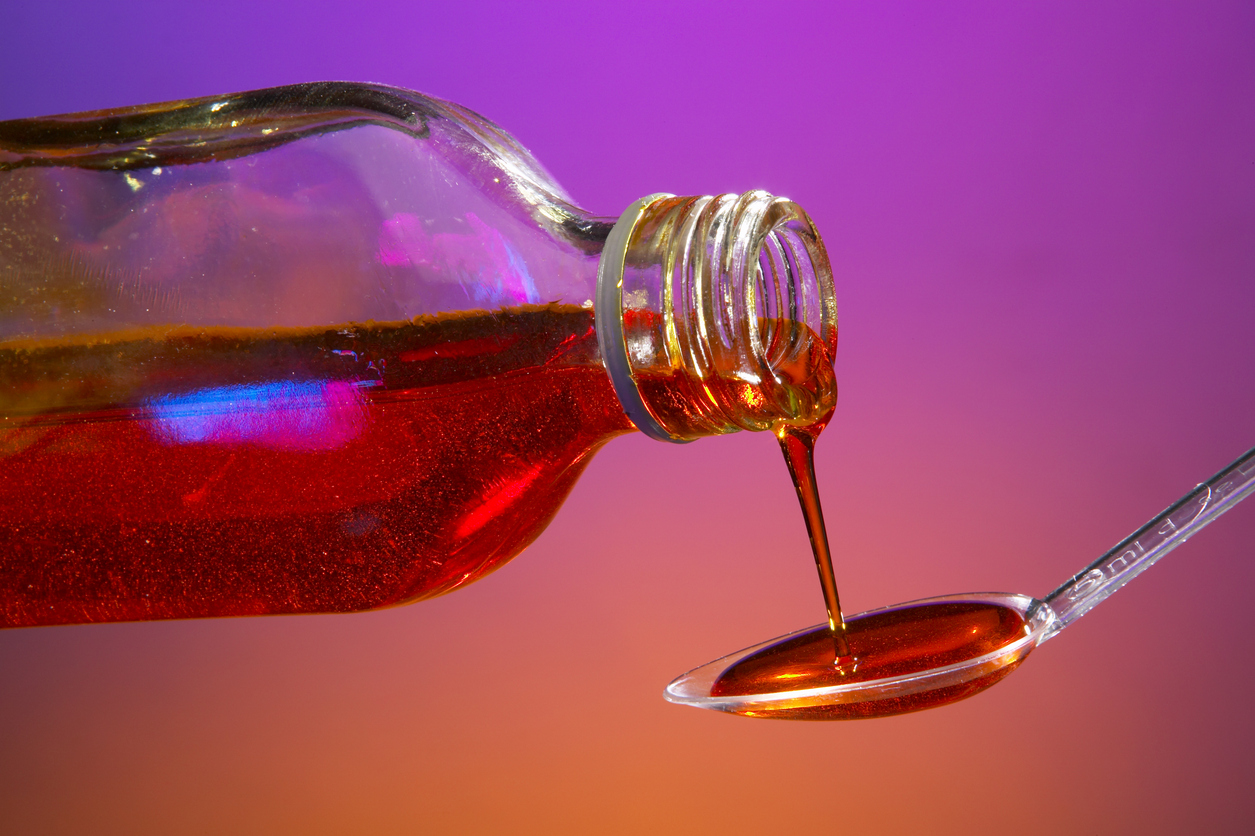Kerala also suspended the sale and distribution of all medicines manufactured by Sresan Pharmaceuticals, based in Kanchipuram, Tamil Nadu.
Published Oct 08, 2025 | 1:33 PM ⚊ Updated Oct 08, 2025 | 1:33 PM

Representational image. Credit: iStock
Synopsis: Telangana’s Drugs Control Administration banned two cough syrups, “Relife” and “Respifresh TR,” contaminated with toxic Diethylene Glycol. Meanwhile,. Kerala halted all products from Rednex and Sresan Pharmaceuticals after quality violations. The actions follow a tragedy where 16 children died from adulterated Coldrif syrup, prompting nationwide inspections and advisories against cough syrup use in young children.
The Drugs Control Administration, Telangana, has banned two more cough syrups found adulterated with Diethylene Glycol (DEG) – a highly toxic substance – even as Kerala imposed a sweeping statewide halt on products from the implicated manufacturers.
The alert, based on lab reports from the Drug Testing Laboratory, Government of Madhya Pradesh identified “Relife” cough syrup (Batch No. LSL25160, Expiry 12/2026) manufactured by Shape Pharma Pvt. Ltd., Gujarat, and “Respifresh TR” cough syrup (Batch No. R01GL2523, Expiry 12/2026) manufactured by Rednex Pharmaceuticals Pvt. Ltd., Ahmedabad, Gujarat, as contaminated with DEG.
The public has been strongly advised to immediately stop the use of these cough syrups if in possession and report the same to the nearest Drugs Control Authority without delay.
The Drugs Control Administration, Telangana, has made available a toll-free number: 1800-599-6969, operational from 10:30 am to 5:00 pm on all working days, for reporting possession of the said products.
All Drugs Inspectors and Assistant Directors across Telangana were directed to immediately alert all retailers, wholesalers, distributors and hospitals to freeze any available stocks of the said product batches and ensure that the same are not dispensed or sold under any circumstances.
The Drugs Control Administration has initiated necessary enforcement measures and is actively monitoring the situation to prevent further risk to public health.
In a parallel action, the Kerala Health Department imposed a statewide ban on the sale and distribution of medicines manufactured by Rednex Pharmaceuticals and suspended all products from Sresan Pharmaceuticals, Tamil Nadu, over quality and regulatory violations.
The department banned the sale of Respifresh TR syrup (60 ml) after the Gujarat Drugs Controller declared the batch not of standard quality. The Kerala Drugs Control Department issued an immediate stop-sale order, instructing five Kerala-based distributors to cease all activities and withdraw the product from the market immediately.
Health Minister Veena George warned that stringent action would be taken against any pharmacy, distributor or vendor found selling or stocking the banned products. She urged the public not to use any remaining stock of the syrup and reaffirmed the government’s commitment to maintaining strict pharmaceutical standards, stating that the measures are part of the state’s uncompromising stance on ensuring drug safety.
In a related move, Kerala suspended the sale and distribution of all medicines manufactured by Sresan Pharmaceuticals, based in Kanchipuram, Tamil Nadu.
The decision follows action initiated by the Tamil Nadu Drugs Controller to cancel the firm’s manufacturing licence. The Health Department clarified that neither Respifresh TR nor Sresan Pharmaceuticals’ products are supplied through government hospitals.
The latest alerts come in the wake of a devastating tragedy that claimed at least 16 children’s lives in MP and Rajasthan between early September and late September after consuming Coldrif cough syrup allegedly adulterated with Diethylene Glycol.
Laboratory reports from both Madhya Pradesh and Tamil Nadu governments confirmed the presence of DEG in alarming concentrations—over 46 percent in the former’s lab report and 48.6 percent in latter’s report. The permissible limit for DEG is just 0.1 percent.
The tragedy unfolded primarily in Chhindwara district, Madhya Pradesh, where six children died between 4 September and 26 September. In Rajasthan, three confirmed deaths occurred in separate districts: two children in Sikar, including a five-year-old who died on 29 September; one in Bharatpur on 22 September; and one in Banswara. 13 children, including eight from Chhindwara and Nagpur, remain under treatment.
Medical reports revealed a disturbing pattern amongst affected children. Victims initially presented mild fever and cold symptoms and appeared to recover before their conditions suddenly deteriorated. Critical symptoms included complete cessation of urine output, persistent vomiting, facial and body swelling and rapid progression to acute kidney failure.
The contaminated Coldrif syrup (Batch No. SR-13, manufactured in May 2025 with expiry in April 2027) was manufactured by Sresan Pharma, located in Sunguvarchathiram, Kancheepuram district, Tamil Nadu.
Following the incidents, Tamil Nadu authorities shut down the manufacturing facility after test results confirmed adulteration and imposed a statewide ban on Coldrif sales effective 1 October.
Additionally, deaths in Rajasthan were linked to dextromethorphan hydrobromide syrup manufactured by Jaipur-based Kaysons Pharma. Rajasthan suspended State Drug Controller Rajaram Sharma for allegedly influencing the drug testing process and ordered suspension of supplies of all 19 medicines produced by Kaysons Pharma.
Following these incidents, the Directorate General of Health Services issued a nationwide advisory on 3 October, stressing that “cough and cold medications should not be prescribed or dispensed to children under 2 years” and are “generally not recommended for ages below 5 years.”
Kerala has directed officials to intensify inspections to prevent the circulation of substandard drugs through private channels. Minister Veena George also directed the Drugs Control Department to take strict action against pharmacies or healthcare establishments that provide medicines for children below 12 years of age without a valid doctor’s prescription.
The public has been urged to exercise utmost caution and refrain from using the aforementioned products to avert any potential health hazards associated with diethylene glycol toxicity.
The expanding list of contaminated cough syrups has sparked nationwide concern about pharmaceutical quality control and regulatory oversight, with multiple states now conducting aggressive inspections of medicine stocks across government and private healthcare facilities.
(Edited by Amit Vasudev)
